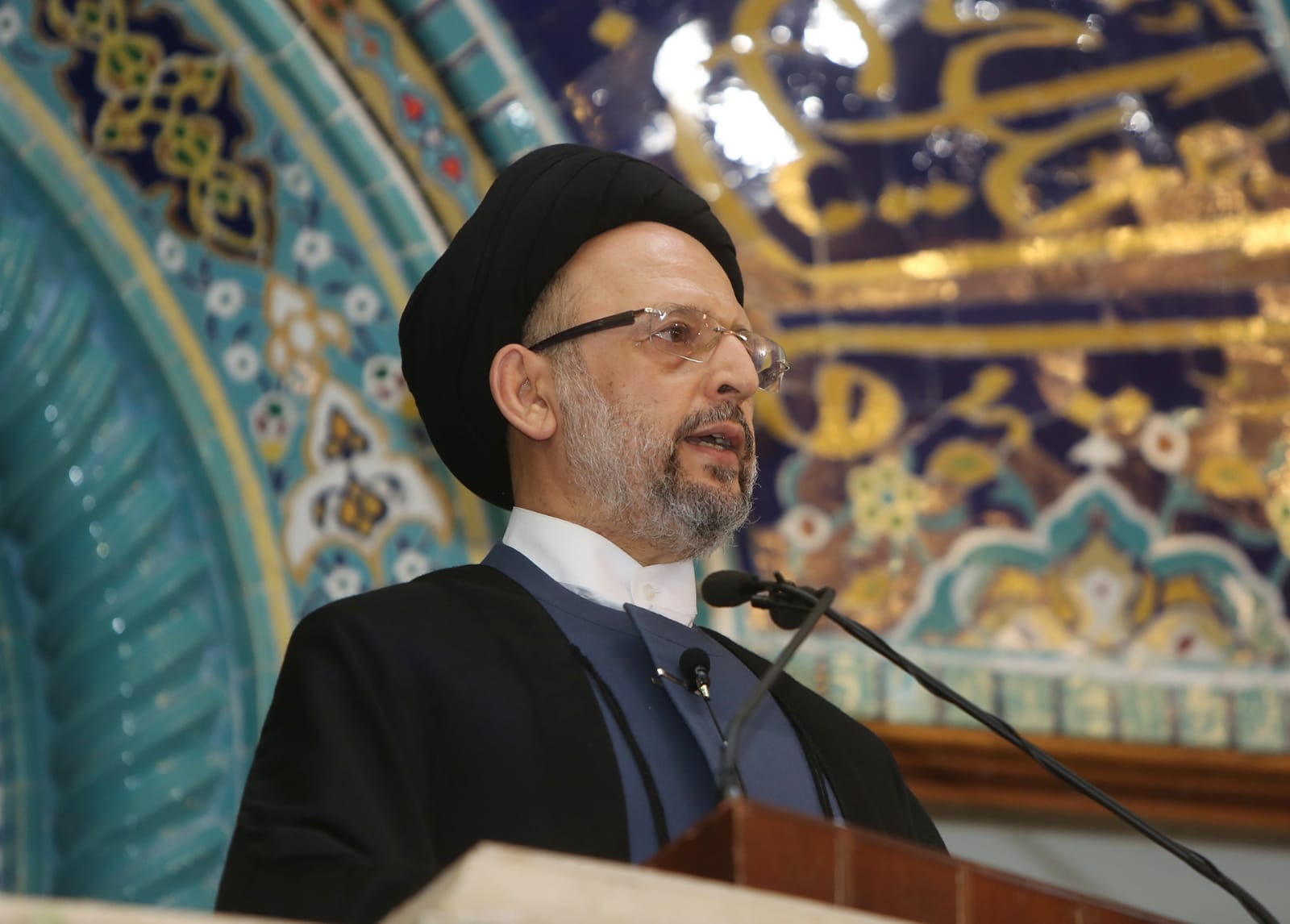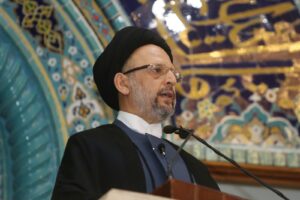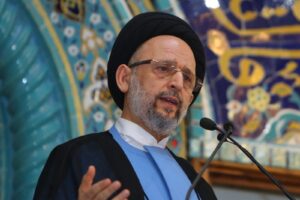In The Name of Allah, The Compassionate, The Merciful.
His Eminence, Sayyed Ali Fadlallah, delivered the two Friday prayer sermons at the Imamain Al-Hassanain Mosque, JamadaII 26, 1446/December 27, 2024. Several prominent religious scholars, dignitaries, and hundreds of believers attended the Jumu’a prayer. Following is a summary of the sermons.
The First Sermon
Allah, the Most Exalted, says in His Glorious Book: O You who have believed, fear Allah, and let every soul look to what it has put forth for tomorrow, and fear Allah. Indeed, Allah is All-Aware of what you do. And do not be like those who forgot Allah, so He made them forget themselves. Those are the defiantly disobedient. Not equal are the companions of the Fire and the companions of Paradise. The companions of Paradise are the successful.”
A Blessing and a Responsibility
In this verse, Allah commands the believers to fear Him and prepare for the day they will stand before Him. On that day, Allah will question them about how they spent the precious time He granted them: What did they do with it? Did they fulfill the responsibilities entrusted to them and perform the duties He commanded, or did they squander this time in futile pursuits or in things He prohibited? This is emphasized in the Hadith: “A servant’s feet will not move on the Day of Judgment until he is asked about four matters: his body and how he used it, his life and how he spent it, his wealth from where he acquired it, and where he spent it.” Allah, the Most Exalted, does not want the believers to waste this opportunity of life, and the Hadiths urge them to utilize every minute, hour, day, and night before it runs out. As one Hadith states, “Your life is limited, and no one will surpass what is decreed for them. So hurry before your time ends.”
The Quran warns about the fate of those who waste their lives:
“And they will call out in Hell, ‘Our Lord, remove us from it, and we will do righteous work other than what we were doing.’ Did We not give you life enough for whoever would be reminded therein to be reminded, and the warner had come to you? So taste, for there is no helper for the wrongdoers.”
The Prophet (p.) cautioned: “Beware of wasting your life on what will not benefit you, for once it is gone, it will never return.”
Imam Zain al-Abidin (a.s.) expressed his regret for wasting time in his supplication during the night: “O Allah, take me to the station of repentance to You, and help me to weep for my soul. I have wasted my life in procrastination and hopes, and I have descended to the state of those who despair of their own good. Who could be in a worse state than me, if I am transferred to my grave in such a state, unprepared, and without righteous deeds to lay down for my rest?”
Imam Ali (a.s.) also described the feeling of regret one might experience as death approaches, pondering the time squandered: “Then death increases its entrance into them, and it is prevented from speaking, though they are among their family, able to see with their eyes and hear with their ears, with their mind intact, thinking about how they spent their life and how they wasted their years.”
The path to making the most of life, to fulfilling one’s purpose and offering an excuse to Allah, is pointed out in the hadith: “Your life is the price of your happiness. If you spend it in the obedience of your Lord, you have gained.”
“Guard your life from wasting it in anything other than worship and obedience.”
As time is fleeting, it is essential to turn every moment into a valuable investment for the Hereafter. Surah Al-Asr explains what should fill one’s life: “By time, indeed, mankind is in loss, except for those who have believed and done righteous deeds and advised each other to truth and advised each other to patience.”
Thus, the human being is always at a loss because with every passing day, they lose a part of their time. But they are not truly lost if they utilize their life in faith and righteous deeds, becoming a source of goodness for others, guiding them to the truth and to patience.
However, this does not mean that Islam denies people the right to rest in their life, which is necessary. But according to Islam, rest must be for the sake of fulfilling one’s responsibilities to Allah and others, not at their expense. As one Hadith states: “The believer has three periods: one in which he engages in private worship with his Lord, another in which he sustains his livelihood, and another when he enjoys legitimate pleasure, for this helps him in the other two.”
Dear loved ones, we can achieve a lot for ourselves and for those around us when we make good use of this great blessing—the gift of life that Allah has granted us. The minute that passes, which we might not notice, can lead to great results if we use it well. In one minute, we can reconnect with a relative over the phone, speak words that open hearts to goodness and charity, offer advice to someone in need, bring joy to others through a smile or sincere expression, listen to someone’s complaint, fulfill a need, ease the burden of a distressed person, support a just cause, or stand against oppression—especially in these difficult times.
In just one minute, which we might dismiss as insignificant, we can join in the praise of Allah, and in that minute, we could be participating with the angels in prayers upon Prophet Muhammad and his family. Life is made of many such minutes, and we will regret wasting them when we stand before Allah.
Dear loved ones, we have become so accustomed to letting time slip by that we rarely stop to account for how we are spending it. We should be constantly mindful of how we are using our life, not letting excuses or the opinions of others determine how we fill our time. Self-accountability is the best way to avoid this. The Prophet (p.) said: “None of us is truly one of us unless they hold themselves accountable daily. If they have done a good deed, they should ask Allah to increase it and thank Him. If they have done something wrong, they should ask for forgiveness and repent.”
In this spirit—responsible for our time, accountable for the past, and planning for the future—we look ahead to the beginning of a new year. This is reflected in the actions of the Prophet (p.), who used to hold himself accountable at the start of every year by performing two rak’ahs and then saying: “O Allah, whatever I have done in this year that You have forbidden, and I have forgotten but You have not forgotten, and You have called me to repent after I have wronged myself, I ask for Your forgiveness.”
Then, he would ask Allah to help him overcome the challenges of the coming year and to fulfill his responsibilities. He (p.) would say: “O Allah, this is a new year, I ask You for protection from Satan, strength over my soul, and to keep me busy with what brings me closer to You, O Generous One.”
O Allah, make the future of my affairs better than my past, and the best of my deeds the last ones, and the best of my days the day I meet You, O Most Merciful of the merciful.
The second sermon
Worshippers of Allah, I advise you and myself to follow the teachings of the Prophet (p.) to one of his companions, when he came to him saying: “O Messenger of Allah, advise me.” He (p.) replied, “Do not get angry,” and repeated it several times, “Do not get angry.”
We are in great need of this advice, which calls us not to act based on emotional impulses or tension, but rather with a calm mind that reflects on the results and consequences, with insight and guided by our faith and what it calls us to do. This way, we can avoid the harmful effects of anger in both this world and the Hereafter, as the Hadith mentions: “Anger is the key to all evil.” We also seek to gain what Allah promises to those who control their anger, as stated in the Hadith: “Whoever refrains from his anger toward people, Allah will refrain from His punishment on the Day of Judgment.” By doing so, we become more aware, responsible, and capable of facing challenges.
Starting with the Israeli aggression, the Zionist enemy continues to violate the ceasefire agreement by demolishing remaining buildings in the villages it occupied, expanding into villages it had not reached during its aggression, as witnessed yesterday in Al-Qantara and Wadi al-Hujayr, and before that in Naqoura. The enemy’s airstrikes have also targeted the Bekaa region for the first time since the ceasefire, and its drones have reached Beirut and its suburbs. At the same time, the enemy continues to delay the promised withdrawal within sixty days, which has not even completed its first phase. This indicates the enemy’s lack of seriousness in implementing the terms of the agreement. The enemy’s media now suggests that this delay might extend beyond the sixty days, which may be an attempt to impose new security, military, and political conditions on the Lebanese, conditions they believe can be achieved due to regional developments. Meanwhile, the Lebanese side continues to adhere to the terms of the agreement, despite the provocations it faces, leaving it to the supervising committee to carry out its required role.
All this happens amidst continued delays by this committee and the world’s silence in condemning the enemy’s actions. In the face of this, we hold all parties responsible for the agreement, urging them to swiftly fulfill their roles, as this situation cannot continue or be accepted.
Here, we highlight the official stance represented by the visit of the Prime Minister, accompanied by the Army Commander, to the border region, affirming Lebanon’s sovereignty over it in the face of the enemy’s threats to maintain control over it in one form or another. This visit also served as a warning regarding the repercussions of the enemy’s violations, which could lead to the collapse of the agreement.
Given this situation, we renew our call to all political parties and religious institutions in Lebanon to stand united against the enemy’s insistence on violating Lebanon’s sovereignty and independence. They must work to prevent it from exploiting internal divisions to solidify its occupation or domination. This is a national responsibility that transcends the interests of sects or political factions.
Lebanese people need now, more than ever, to freeze their differences, sensitivities, and disputes in order to confront the dangers they face internally, as well as the economic, living, and security crises. The challenges posed by their southern and eastern borders, as well as the regional turmoil, demand that they confront these issues with unity, not in the weakened state we currently witness. The region is witnessing the construction of new maps, through which a new Middle East is being shaped, where the Zionist entity has the upper hand. This cannot be addressed with the current fragility, nor with a fractured state.
Hence, we urge all concerned parties to accelerate every effort to ensure the election of a president for the republic on January 9, as we fear that this may not happen given the lack of seriousness in working toward the political consensus necessary for this critical election.
At this time, we call for further efforts from the state to continue clearing the massive rubble still surrounding the Southern Suburbs, the South, and the Bekaa, and to provide assistance ensuring housing for those who have lost their homes. We also call for support for business owners and institutions to resume their operations. Additionally, we urge the intensification of efforts to begin the reconstruction process, which we fear could be delayed due to the lack of resources within the state or any other entity, and which we fear might be used as additional leverage against Lebanon.
Turning to Gaza, the enemy continues its massacres, demolishing homes and burning tents that house refugees, attempting to force them to leave their places of residence and seek shelter elsewhere. This is part of their effort to tighten their grip on the area and discourage its inhabitants from remaining. Meanwhile, the enemy continues to evade agreeing to any ceasefire agreement, even if it risks the lives of its remaining hostages. Here, we commend the steadfastness of the Palestinian people, their patience, and their resistance, which is also strengthened in the West Bank despite the wounds and pain they endure. In this regard, we hope for swift action to strengthen internal Palestinian unity in the face of all the enemy’s attempts to entrench internal division and pressure the Palestinian Authority into fighting its people and resistance factions under threats.
We also turn to Yemen, which is enduring an aggression targeting its resources and infrastructure due to its continued support for the Palestinian cause and people and its efforts to halt the ongoing massacre of the Palestinian people.
We affirm our solidarity with the Yemeni people in this confrontation, and we call on the Arab and Islamic nations to stand with this Arab and Islamic country to prevent its isolation and harm. Yemen has proven to be a pillar for Arab and Islamic causes and for the oppressed around the world, making sacrifices for these noble causes.
Finally, as we are in the Christmas season, we extend our congratulations to Muslims and Christians alike on the blessed birth of Jesus (a.s.), which we hope will serve as an opportunity for joint work aimed at promoting moral and humanitarian values, spreading love and mercy in hearts, which are the foundations upon which societies, nations, and civilizations are built. We also hope that the new year will bring good news, safety, and peace to our country and the world.




